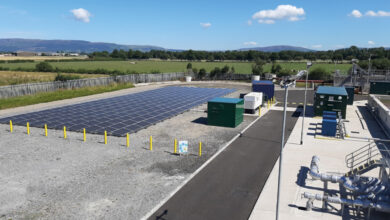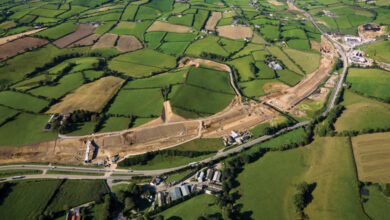Uncertainty surrounding Northern Ireland’s infrastructure investment

The passage of the Northern Ireland Budget Act, coupled with the UK-wide Spring Budget, leaves a lot of uncertainty for Northern Ireland’s infrastructure, with funding only to be allocated for projects which were signed off by the Executive prior to its collapse.
In the absence of a sitting Executive, Secretary of State Chris Heaton-Harris MP set the framework for a budget for Northern Ireland which was subsequently passed as a parliamentary Act in January 2023.
In his statement to the House of Commons in November 2022 outlining the draft guidelines for what became the Northern Ireland Budget Act, Heaton-Harris outlined his belief that: “Northern Ireland Ministers have long failed to demonstrate prudent fiscal management.
“Almost 10 years on from the commitments made in the Stormont House and Fresh Start agreements to put Northern Ireland’s public finances onto a sustainable footing, long promised public service transformation and fiscal sustainability has not been delivered.”
Complemented by the lack of a sitting Executive, as the DUP continues to use its boycott of the institutions to exercise leverage over the UK Government to change the Northern Ireland Protocol, devolved finances had been in the hands of Neil Gibson, Permanent Secretary for the Department of Finance, who was responsible for the implementation of previously-allocated funding.
Prior to the collapse of the Northern Ireland Executive, then-Finance Minister Conor Murphy MLA warned that the region was facing an overspend of over £600 million, in spite of over £300 million having remained unspent during the previous mandate.
Northern Ireland Budget Act 2023
Passed in January 2023, the Northern Ireland Budget Act provides financial allocations for the rest of the current financial year (ending 31 March 2023) along with provisional allocations to each department for the 2023/24 financial year, although the Secretary of State has stated that “…if the Executive has been restored in time for a budget for 2023/24, the UK Government will continue to work constructively with Executive Ministers, including on a sustainable budget that works for the people of Northern Ireland and supports economic growth”.
The budget raises infrastructure resource spending in Northern Ireland by 4.4 per cent when compared with the previous financial year, once the exclusions have been made of the one-off financial support during the Covid-19 lockdowns, with the overall funding allocation for the 2023/24 financial year for the department amounting to £999 million, although this means it will still be running at a deficit, despite the fact that public spending in Northern Ireland is 21 per cent higher per capita than in the rest of the UK.
The allocation of the budget within the Department has not yet been set, although a spokesperson from the Department for Infrastructure told agendaNi: “Once the Department’s budget has been set, we will carefully consider the impact on service delivery. Given the overall financial position facing Northern Ireland departments, it is likely that some very difficult decisions will be required that will impact on the level of essential services delivered.”
The Secretary of State explained that this allocation will be used for funding existing projects, such as the A5 and A6 road (which is set to be completed by the end of April 2023) schemes, as well as the York Street Interchange.
However, a number of projects, including the All-Island Rail Review, will not be enabled by the budget in and of itself due to the requirement for the reformation of an Executive, with the project requiring review and sign-off from a Minister for Infrastructure.
The supporting memorandum of the legislation outlines the scope in difference in the number of sources of income for the Department for Infrastructure when compared with its amount of expensive projects.
“If the Executive has been restored in time for a budget for 2023/24, the UK Government will continue to work constructively with Executive Ministers, including on a sustainable budget that works for the people of Northern Ireland and supports economic growth.”
Northern Ireland Secretary Chris Heaton-Harris MP in November 2022.
Northern Ireland, the supporting memorandum explains, will continue to receive EU funding on infrastructure projects, although it is not clear how much. Additionally, sources of income are outlined in the forms of the Mater Hospital car park, operation of the blue badge scheme, and increasing enforcement of parking charges.
UK Spring Budget
With infrastructure and transport a devolved issue in Northern Ireland, there is little by the way of UK-wide measures which will be significant for the transport sector in Northern Ireland from the UK Spring Budget, announced on 15 March 2023.
The UK Budget, in a rhetorically similar vein to that of the Kwasi Kwarteng budget, was billed as a ‘budget for growth’. The most significant measure for the transport sector on a UK-wide basis is the freeze in fuel duty, a measure which was meant to be temporary amid the cost-of-living crisis, although UK fuel duty remains among the highest in the European continent.





